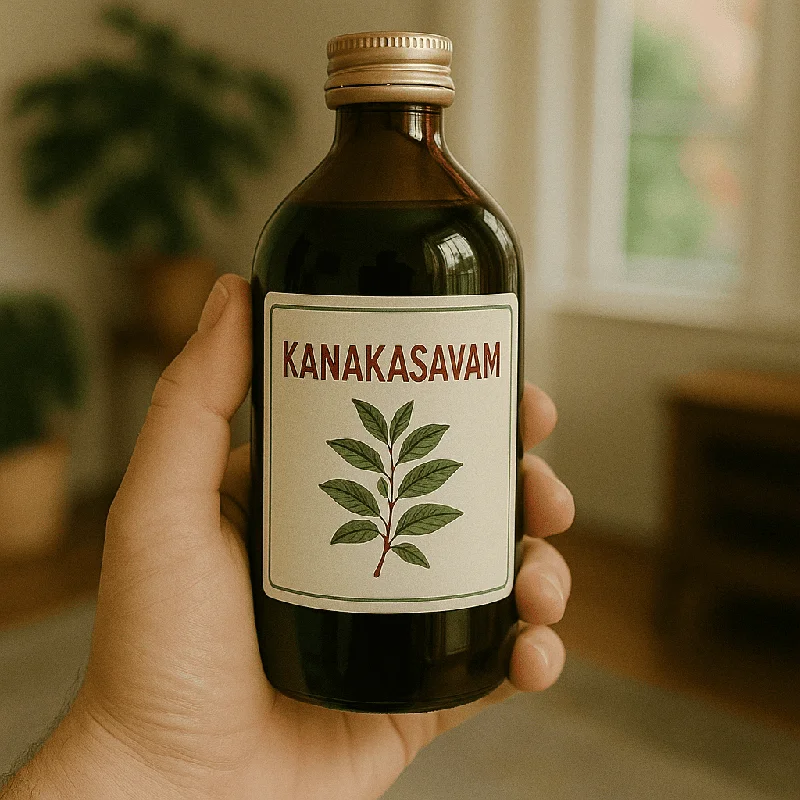Ask Ayurvedic doctor a question and get a consultation online on the problem of your concern in a free or paid mode. More than 2,000 experienced doctors work and wait for your questions on our site and help users to solve their health problems every day.
Kanakasavam Benefits: An Evidence-Based Exploration

Introduction
Imagine waking up in the morning without the usual sniffles or the nagging cough that disrupts your daily routine. In Ayurvedic medicine, many people turn to Kanakasavam—an herbal concoction purported to support respiratory health, immunity, and overall wellness. According to a report by the World Health Organization (WHO), traditional medicine still plays a key role for nearly 80% of the world’s population, illustrating the broad interest in alternatives to modern pharmacotherapy. But how solid is the evidence behind the claimed Kanakasavam benefits?
In this comprehensive guide, we delve into the composition, traditional uses, and current scientific research surrounding Kanakasavam. By blending expert perspectives, peer-reviewed studies, and practical healthcare tips, we aim to offer a clear, balanced, and authoritative view on whether Kanakasavam truly lives up to its reputation.
Don't wait or self medicate. Start chat with Doctor NOW
What Is Kanakasavam?
Kanakasavam (also spelled “Kanakasava”) is a classical Ayurvedic formulation traditionally prepared by fermenting medicinal herbs. Its name is derived from the Sanskrit word “Kanaka,” which can refer to “Datura metel,” a key ingredient in some preparations. The end product is typically a brownish liquid with a mildly sweet aroma, attributed to the jaggery or sugar base used in the fermentation process.
Key Points to Know:
- Main Ingredients: Common herbs include Datura metel, Adhatoda vasica, Piper longum, and Glycyrrhiza glabra(licorice), among others.
- Traditional Preparation: Herbs are soaked in water, along with a natural fermenting agent (like jaggery), and allowed to ferment over a specific time frame.
- Forms Available: Kanakasavam can be found in liquid form, sometimes referred to as an “asava” or “arishta,” widely sold under various Ayurvedic brand labels.
The Historical and Cultural Context
Kanakasavam Benefits in Ayurveda
In Ayurvedic texts, Kanakasavam is often recommended for respiratory issues. Ancient Ayurvedic practitioners believed that fermenting certain herbs improved their potency and bioavailability. The synergy of its constituents is said to:
- Support Respiratory Function: Address coughs, bronchitis, and other breathing challenges.
- Promote Digestive Health: Aid in managing minor gastrointestinal discomforts.
- Boost Immunity: Strengthen the body’s natural defense mechanisms.
Over time, Ayurvedic doctors also began using Kanakasavam for issues like mild fever, fatigue, and stress-related conditions. Despite being a “traditional” remedy, modern healthcare providers sometimes include it in integrative treatment plans, especially within India and other regions where Ayurveda is embraced.
Composition and Mechanism of Action
The Herbal Powerhouse Behind Kanakasavam
The biological activities of Kanakasavam primarily stem from its plant-based ingredients, each offering a unique therapeutic profile. Let’s take a closer look:
-
Datura metel (Dhatura)
- Traditional Use: In Ayurveda, Dhatura is praised for its antispasmodic and bronchodilatory properties.
- Modern Perspective: Some controlled studies suggest that extracts of Datura may relax bronchial muscles, potentially helping with wheezing or shortness of breath. However, caution is advised due to the plant’s toxic alkaloids (e.g., atropine, hyoscyamine).
-
Adhatoda vasica (Vasaka)
- Traditional Use: Renowned in Ayurveda for easing respiratory congestion and facilitating better airflow.
- Modern Perspective: A 2018 study in the Journal of Ethnopharmacology found that Adhatoda vasicaextract exhibits bronchodilatory and expectorant effects, which may help clear mucus in the respiratory tract.
-
Piper longum (Long Pepper)
- Traditional Use: Employed for its warming properties, aiding digestion, and respiratory relief.
- Modern Perspective: Piper longum contains piperine, a compound shown to enhance the bioavailability of other therapeutic substances and may help modulate inflammation.
-
Glycyrrhiza glabra (Licorice)
- Traditional Use: Known for its soothing effect on the throat and respiratory passages.
- Modern Perspective: A 2020 meta-analysis published in Pharmacognosy Reviews indicated that licorice possesses anti-inflammatory, antimicrobial, and demulcent properties, supporting throat comfort.
How These Ingredients Work Together
When fermented, the biochemical composition of these herbs is believed to transform in ways that enhance their therapeutic potential. Fermentation may increase certain plant enzymes and help in the breakdown of complex compounds, making them easier for the body to absorb. Coupled with the presence of piperine (from Piper longum), this synergy could amplify the overall efficacy of Kanakasavam.
Scientifically Examined Benefits
Current Evidence on Kanakasavam
While robust, large-scale clinical trials on Kanakasavam specifically are limited, preliminary studies and anecdotal reports suggest potential benefits, particularly for respiratory health.
1. Respiratory Support
- Reducing Cough Frequency: Ingredients like Adhatoda vasica and Licorice have demonstrated expectorant qualities, which may help in loosening and expelling phlegm.
- Bronchodilatory Effect: Datura metel and Adhatoda vasica may work synergistically to expand the airways, easing shortness of breath.
2. Immune Modulation
- Antimicrobial Action: Certain phytochemicals in Kanakasavam’s herbal mix may help combat common pathogens that attack the respiratory tract.
- Anti-inflammatory Potential: Chronic inflammation can exacerbate respiratory conditions. Studies on licorice and long pepper show promising anti-inflammatory effects that could contribute to symptom relief.
3. Stress and Mood Support
- Calming Properties: Some users report mild sedative effects, which could help individuals struggling with sleep disruptions due to coughing or congestion.
- Mind-Body Link: Ayurveda highlights the importance of mental well-being in disease management. By offering a calming influence, Kanakasavam might indirectly support stress relief.
Important Note: Most of these findings stem from small pilot studies or extrapolations from the known benefits of individual herbs, rather than large-scale randomized controlled trials on Kanakasavam itself. For conclusive evidence, more research is warranted.
Practical Applications and Dosage
Incorporating Kanakasavam Into Healthcare
In traditional Ayurvedic practice, Kanakasavam is usually prescribed by a qualified Ayurvedic practitioner. Typical dosing recommendations can vary but often hover around 12–24 ml twice daily, post-meal.
Step-by-Step Usage Tips
- Consult an Expert: A certified Ayurvedic doctor can provide a personalized prescription, factoring in your age, body constitution (prakriti), and specific health concerns.
- Start Low, Go Slow: If you’re new to Kanakasavam, start with the lower recommended dose and observe your body’s response.
- Monitor for Side Effects: Keep an eye out for gastrointestinal discomfort, dizziness, or allergy-like symptoms.
- Store Properly: Keep the container tightly sealed at room temperature, away from direct sunlight.
Contraindications and Cautions
- Pregnancy and Nursing: Due to limited safety data, pregnant or breastfeeding women should avoid using Kanakasavam unless advised by a qualified healthcare provider.
- Liver or Kidney Conditions: Fermented herbal products might stress these organs in sensitive individuals; discuss with a healthcare professional beforehand.
- Pre-Existing Respiratory Conditions: While Kanakasavam is often used for respiratory issues, those with severe conditions like uncontrolled asthma should exercise caution and seek professional medical advice.
Potential Side Effects and Safety Profile
Navigating the Risks
As with any medicinal preparation, Kanakasavam poses potential risks if misused:
- Toxicity from Datura: Datura metel contains alkaloids that can be toxic in high doses, potentially causing symptoms like dry mouth, blurred vision, or confusion.
- Alcohol Content: As a fermented product, Kanakasavam typically contains a small percentage of alcohol (ranging from 5% to 10%). This can interact with certain medications or exacerbate conditions like liver disease.
- Allergic Reactions: Although rare, some individuals may be allergic to specific herbal components. Always do a patch test or start with a minimal dose under supervision.
Expert Tip: Choose Kanakasavam only from reputable manufacturers who follow Good Manufacturing Practices (GMP). This ensures quality control and accurate labeling.
Balancing Traditional Knowledge with Modern Science
A Critical Perspective
The field of Ayurveda has centuries of clinical observations behind it, but modern science often demands evidence from randomized controlled trials and meta-analyses. Kanakasavam’s popularity is driven by anecdotal success stories and smaller-scale studies on its constituent herbs.
- Supportive Evidence: Multiple peer-reviewed articles highlight the anti-inflammatory, expectorant, and bronchodilatory effects of Adhatoda vasica, Datura metel, and licorice.
- Gaps in Research: There’s a notable lack of large-scale, high-quality clinical trials specifically investigating Kanakasavam in diverse populations.
- Future Directions: Research collaborations between Ayurvedic institutions and modern medical research centers could shed more light on optimal dosing, efficacy, and long-term safety.
Disclaimer
The information presented here is for educational purposes only and should not replace professional medical advice. Always consult a qualified healthcare provider before starting any new supplement or treatment, especially if you have an existing medical condition or are on medication.
Frequently Asked Questions (FAQ)
Q1: Can Kanakasavam be taken without a doctor’s prescription?
A1: While it is an over-the-counter Ayurvedic preparation in some regions, consulting a healthcare professional is strongly recommended to determine proper dosage and suitability.
Q2: Is Kanakasavam safe for children?
A2: Due to its alcohol content and potent herbs, Kanakasavam is generally not recommended for children under 12 unless advised by an Ayurvedic physician or pediatrician.
Q3: How soon can I expect results?
A3: Results vary based on individual factors and the severity of the condition. Some people experience relief within a few days, while others may need consistent use for weeks.
Q4: Are there any dietary restrictions while taking Kanakasavam?
A4: Ayurveda often suggests a balanced diet low in irritants like spicy and fried foods to complement herbal treatments. However, specific restrictions can vary by individual and should be discussed with a practitioner.
Q5: Can I combine Kanakasavam with other supplements or medications?
A5: Always consult a healthcare provider, as certain ingredients in Kanakasavam might interact with prescription drugs or other herbal supplements.
Conclusion
Kanakasavam benefits—particularly its potential to support respiratory health—hold promise, but they should be understood within the context of both Ayurvedic tradition and scientific scrutiny. This herbal remedy, enriched with Datura metel, Adhatoda vasica, Piper longum, and Glycyrrhiza glabra, has centuries of anecdotal backing. Emerging research on these individual herbs adds some weight to traditional claims, highlighting anti-inflammatory, bronchodilatory, and immune-modulating properties.
Yet, definitive large-scale clinical studies on Kanakasavam as a whole are still needed. Until then, a cautious, well-informed approach is crucial. Speak with a qualified healthcare professional for personalized advice, and always opt for reputable brands that adhere to stringent quality standards.
Call to Action:
If you found this information useful, please share this article with friends or family exploring Ayurvedic options. Leave your comments below on your experiences with Kanakasavam, and subscribe to our newsletter for more evidence-based health insights!
References (Select Examples)
- Journal of Ethnopharmacology – Studies on Adhatoda vasica for Bronchodilatory Effects
- Pharmacognosy Reviews – Meta-analysis on Licorice and its Anti-Inflammatory Properties
- WHO Traditional Medicine Strategy – Emphasizing the Global Prevalence of Ayurveda and Other Traditional Systems



